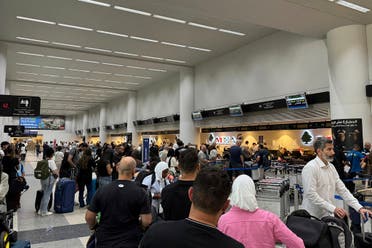Lebanese expats rush for holiday flights post-ceasefire, face high costs and uncertainty

The announcement of a ceasefire between Lebanon’s Hezbollah and Israel on November 27 sparked a surge of holiday bookings among Lebanese expatriates eager to reunite with their families after more than a year of conflict.
The ceasefire deal followed 14 months of intense fighting that left towns and villages in southern Lebanon in ruins, devastated vast parts of the Bekaa Valley and Beirut’s southern suburbs and displaced some 1.2 million people.
Brokered by the US and France, the agreement seeks to curb further escalation and pave the way for stability. However, Israel has been accused by UN, French and Lebanese officials of violating it dozens of times. Hezbollah also violated the ceasefire earlier this week, marking its first breach, heightening fears that the fragile truce could unravel entirely.
The ceasefire prohibits Israel from conducting offensive military operations in Lebanon while requiring Lebanon to prevent armed groups, including Hezbollah, from attacking Israel. It includes a 60-day timeline for Israeli troop withdrawal from southern Lebanon.

A shaky truce has not deterred Lebanese expats from booking flights as the holiday season approaches.
“I booked the same day the ceasefire was announced,” said Michel Chiti, a 32-year-old FMCG professional in Dubai. “I even extended my vacation after hearing the news. I know this will make my family happier, so I’m willing to take the risk and go see them.”
Fawzi El Amm, a 30-year-old regional sales manager based in Jeddah, also secured his flight to Beirut.
“My wife and daughter returned home as soon as the ceasefire was announced,” he told Al Arabiya English. “I can’t wait to join them. I know my little one will love spending Christmas surrounded by family, and we’re looking forward to reuniting with friends who are also heading back for the holidays.”
High demand meets limited supply
The seasonal rush is being met with logistical challenges, as demand far exceeds supply. Middle East Airlines (MEA), the national carrier, was the only airline operating during the war. Although a few airline companies have resumed operations to Beirut following the ceasefire, flight availability remains limited.
“Booking demand to Beirut has skyrocketed following the ceasefire,” Jean Abboud, president of the Association of Travel and Tourist Agents in Lebanon, told Al Arabiya English. “The issue is that demand is extremely high while supply remains limited. Compared to October and November, bookings for December have surged by 75 percent.”
Larissa El Hachem, a Paris-based gynecologist, is among those keenly anticipating her return home for Christmas. “I’m so excited to go back despite it all,” she said. “I’m not worried about the situation. I love everything about Lebanon. I have family and friends there. I mean, what’s the worst-case scenario? Getting stuck? No problem – it’s where I belong.”
The carriers that have resumed flights to Beirut include Royal Jordanian, Ethiopian Airlines, Iraqi Airways and Turkish Airlines.

“Airlines such as Qatar Airways, Emirates and Etihad are set to gradually restart operations in the coming days and weeks,” he noted, explaining that some are waiting for the 60-day period outlined in the ceasefire agreement to conclude before fully resuming flights. Other carriers had diverted their aircraft to alternate routes during the war and are now integrated into different networks.
The truce faced a critical test on Monday when Israel launched its most extensive airstrikes on Lebanon since the agreement took effect last week, killing at least 12 people, according to Lebanese authorities.
The strikes were a response to Hezbollah’s firing of two projectiles into the disputed Shebaa Farms area, which the group described as a warning against Israeli breaches of the truce. The Israeli military said the missiles caused no casualties.
Hesitation amid lingering uncertainty
While many are planning to return for the holidays, limited flight availability, soaring ticket prices and fears of renewed violence have left others hesitant.
Daisy and Dany Ayoub have already booked their flight from Canada to Beirut, hoping their 1-year-old son, Leon, will be able to spend Christmas with his extended family. “We’re still unsure whether we’ll go through with the trip, given the situation’s instability,” Daisy Ayoub said. “We’ve had to cancel our visit to Lebanon multiple times this past year, but we’re hoping this time will be different. It breaks our hearts that our child hasn’t been able to see his family.”
Airport activity has dropped by 75 percent compared to the same period last year, noted Abboud.
“Beirut airport was handling 85 to 90 flights per day in December 2023, with about 13,000 passenger arrivals,” he added. “This year, the daily flight count ranges from 25 to 30, with passenger arrivals between 3,000 and 4,000.”
Still, demand is high, but the limited number of operating airlines has kept flight availability low, driving ticket prices to unaffordable levels for many.
“The cost of tickets is one of the reasons we’re not celebrating Christmas in Beirut this year,” said Mary, a 29-year-old sales professional based in Paris who requested her last name be withheld for privacy. “The second reason is our concern about a potential escalation. We don’t trust the ceasefire.”
Similarly, Luxembourg-based financial consultant Charbel, 31, who also prefers not give his last name, decided against returning to Lebanon for Christmas due to security concerns.
“This will be my first Christmas away from home, which makes this decision particularly difficult,” he told Al Arabiya English. “Christmas is the only time our large family gathers. I will miss our traditions and the holiday feast, but I can’t take the risk. If the ceasefire collapses and travel becomes impossible, I may not be able to make it back, which could jeopardize my career.”
A fragile boost for the economy
The return of expats during the holiday season could provide a temporary boost to Lebanon’s battered economy.
The World Bank gave a preliminary estimate of $8.5 billion in damage and losses to Lebanon in a November 14 report. Lebanon’s real GDP is projected to contract by 5.7 percent in 2024, compared to a pre-conflict growth estimate of 0.9 percent.
Tourism and hospitality, key contributors to Lebanon’s economy, have been hit hardest, with losses reaching $1.1 billion, according to the World Bank.

The tiny Mediterranean country is already facing one of its worst financial crises, a situation compounded by the collapse of its banking system, skyrocketing inflation and an ongoing liquidity crisis. This has led to widespread poverty, and the country is increasingly reliant on foreign aid to address its dire conditions.
Lebanon’s foreign-exchange reserves fell by around $500 million since Israel began its ground invasion in October as the central bank spent dollars to prop up the pound after weeks of war.
Analysts suggest that the ceasefire, timed just before Christmas, may provide a temporary boost to the country’s limited reserves.
“The return of expats brings immediate benefits: a surge in consumer spending, especially on food, gifts and entertainment, which can provide a lifeline for struggling small businesses,” Lebanese economist Walid Abousleiman said. “In addition, expats often bring cash in US dollars, offering a temporary boost to liquidity and helping stabilize the exchange rate.”
He continued, “However, while these benefits offer temporary respite, they cannot replace the need for comprehensive reforms. Despite an anticipated $500-700 million influx, the impact will be fleeting,” he added. “Lebanon’s deeper economic issues, including political paralysis and a dysfunctional banking system, require long-term solutions to ensure sustained recovery.”










